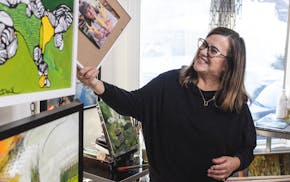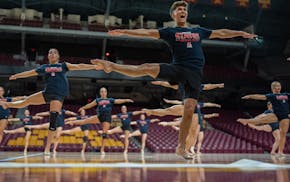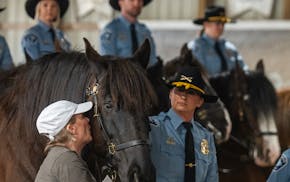To have a mom is to know her in the context of you.
Does she clean up your knee after a fall? Does she cheer your name from the bleachers or pump her fist when you take the shot?
Something strange started to happen to the three Mauer kids as they were growing up in St. Paul, excelling in baseball, football and basketball. Though Teresa Mauer never talked to her sons about her playing days, people in her community remembered. They'd tell the boys, "Your mom is the best athlete in your family."
The kids heard it constantly. From umpires and refs. Parents of friends. Coaches at the Jimmy Lee rec center. Teresa's athletic dominance became undeniable to Joe, her youngest, when he was in fourth grade and the rec center organized a parent-kids' basketball game. His teammates were blown away: His mom was a baller.
"She kinda took over the game," recalls Joe, cracking a smile.
You may know her as the mother of Minnesota Twins legend Joe Mauer, but Teresa Mauer — who went by Teresa Tierney before she was married — was a three-sport athlete in the infancy of girls' prep sports in Minnesota. She helped lead her St. Paul Central basketball team to Minnesota's first official Class AA high school girls' state championship in 1976 and has been inducted into three local halls of fame.
While she also played volleyball and ran track in high school, she couldn't partake in one of her favorite sports, softball, because St. Paul schools didn't have a girls' team at the time. Her senior year, she tried out for baseball along with the boys, but didn't make the cut.
"I tell that to my granddaughters and their friends," Teresa says, "and they look at me, like, 'Holy cow. How old are you?" (She's only 65.)
Her granddaughters are growing up in a world where interest in women's sports is growing at an astronomical pace, where viewership of the women's college basketball finals trounced ratings for the men. Caitlin, Angel, Paige and JuJu are household names, uttered breathlessly by any NCAA and WNBA fan, young or old, of any gender. It's an almost unrecognizable landscape from Teresa's high school years, when, just coming off the heels of the passage of Title IX, girls at Central had to wear the same uniform for track, volleyball and basketball.
Competition started young
Teresa, the third eldest of nine active children, started playing sports with her siblings at the neighborhood playground. In her grade-school years at St. Mark's, she discovered competition, the kind that makes you work harder. The Catholic Athletic Association, which coordinated games, was far ahead of its time, offering girls' sports in addition to boys'.
"Competition gets a bad rap sometimes," she says. "But it can be very good. It teaches you not only how to win, but how to lose gracefully. Like I told my kids, sometimes you did your best but you still lose. But if you did your best, you should feel good. There's nothing else you could have done."
As she grew older, however, the options for deepening her love of sport narrowed. At Ramsey Junior High, girls' teams occasionally competed against other schools on "Play Day." There was no bracket play, and the games were followed by refreshments.
"When they said, 'Now we're gonna sit down with punch and cookies,' I'm going, 'Wait a minute. She just spiked the ball on my face. I'm not sitting down at that table," Teresa says.
Rooting for grandkids
Last Monday morning, Teresa gathered with her 40-something sons — Jake, Bill and Joe — in a restaurant in Mendota Heights. It was a quiet break from what would be a full-throttle day. Two of Teresa's granddaughters had games after school. And Joe would be coaching the season opener for his 5-year-old son, Chip. (Joe wisely enlisted twin 10-year-old daughters, Emily and Maren, as his assistants.)
Teresa has 10 grandkids in all, and nearly every day she helps ferry them to practices and games or simply shows up to cheer them on. She is as constant as the sun, rooting for them the same way her parents did for her and her siblings. (Though her mom and dad were known to sound off with an old-fashioned car horn and cowbell from the stands.)
"They made you think you could do anything, be anything," Teresa says of her parents.
Before pancakes arrive at the table, she and her sons pore over old yearbooks and black-and-white photos documenting the 1970s girls' nascent basketball scene. There she is, in knee-high socks and Converse All Stars, her long dark braids flipping in the air, as she leaps up to celebrate her teammates. "Look how high your mom could jump!" she says.
As one might expect from Joe Mauer's mom, Teresa is as kind and modest as they come. "I was passable," she says of her athleticism. "I wasn't a shooter." A 5-foot-8 guard, her job was simply to dish to her teammates so they could sink the baskets.
Hogwash, says friend Lisa Lissimore, who remembers Teresa welcoming her to the team when Lisa was a sophomore. Teresa had a beautiful jump shot and posed a threat on offense and defense, Lisa says. She consistently landed her shots. More than that, though, as the team's co-captain, Teresa demonstrated leadership and unselfish play.
"She was probably one of the most humble players I've ever played with," says Lissimore. "One of the greatest lessons I learned from her was the lesson in humility."
Central had a lot to prove in 1976. Lissimore, a native of the Rondo neighborhood, once the heart of the city's Black community, remembers wanting to show the state how the game was played in the inner city. Some Minnesotans wanted to write off a racially integrated school that had seen its share of racial tensions in the '60s. "Central, at that time, was us against the world," recalls Teresa. "It wasn't a thing of proving the girls could play. It was proving that the high school was a great place."
And it was. The entire community rallied behind the girls when they landed in the first state championship game at the old Metropolitan Sports Center in Bloomington. Central bested Benilde-St. Margaret's 49-47 in front of 10,000 fans.
Boys' early coach
Teresa brought her competitive edge to the College of St. Catherine, where she played basketball and volleyball. She also brought it to dating, and later parenting. She met her future husband, Jake, at a high school graduation party in which she beat him in a game of horse. As a mom, she'd shoot hoops in the driveway and play catch with her boys in their tiny backyard.
"Mom didn't let you win," cracks son Jake, now 45.
She coached the boys in baseball in their early years, drilling into them the fundamentals. (See the ball, hit the ball.) But when they turned 10, old enough to learn about stealing bases, she passed the torch onto her husband. Among the lessons Teresa and Jake taught their kids: You don't need to be talented to hustle.
Now a parent himself, Joe finds those words emerging from his lips today as he coaches his own children. "We don't walk on the field, we always run on the field. It doesn't take any talent to do that," he says.
For some kids, the post-game analysis on the ride home after a game can be the most dreaded part of competing. Teresa would ask her kids: How did you contribute to your team? What do you think you could have done better? But the conversation always started with her favorite question.
"I just remember Mom asking, 'Did you have fun?' " Joe says.
All of her sons competed in multiple sports a year, something Teresa wonders about being possible today. With the rise of year-round private clubs, she doesn't think they could have afforded it.
Missing Jake Jr.
All three Mauer boys also went to play for the Minnesota Twins — Jake and Bill in the minor leagues, and Joe finishing his 15-year career in 2018. Bill says having experienced the highs and lows of sports, it comforted him to have a mom and a dad who'd been through it, too.
Donald "Jake" Mauer Jr. died in January 2023. Joe says he still has the urge to call his dad to talk about his kids or ask for advice. He's now turning to his mom and brothers even more.
The 41-year-old is headed to Cooperstown in July to be inducted into the National Baseball Hall of Fame. Teresa takes a deep breath and dabs her eyes with a napkin, reflecting on how much she wanted her husband to witness it.
"We've had such great highs. I just wish he was —," she starts, then catches herself. "I know he's there."
Joe says he owes so much of his success to his parents. I asked where he got his humility. He nodded toward his mom. "It's not just what you say, but how you live your life. She was a great athlete in her own right, but she'll never say it."
On Mother's Day, remember this: Our moms can be mysteries to us. But if you're fortunate, yours might tell you a story that you've never heard before, one that helps you understand the kind of woman she ultimately became.

Yuen: When cancer struck a second time, she found 'euphoria'

Yuen: The University of Minnesota's first male dance team member is turning heads by staying real
Yuen: How George Floyd's aunt healed her heart and lent her voice for justice

'This is an uprising': An oral history of the 6 days after George Floyd's murder












